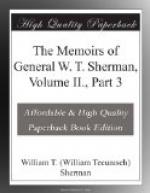You must have been very considerably annoyed by the State negro recruiting-agents. Your letter was a capital one, and did much good. The law was a ridiculous one; it was opposed by the War Department, but passed through the influence of Eastern manufacturers, who hoped to escape the draft in that way. They were making immense fortunes out of the war, and could well afford to purchase negro recruits, and thus save their employees at home.
I fully agree with you in regard to the policy of a stringent draft; but, unfortunately, political influences are against us, and I fear it will not amount to much. Mr. Seward’s speech at Auburn, again prophesying, for the twentieth time, that the rebellion would be crushed in a few months, and saying that there would be no draft, as we now had enough soldiers to end the war, etc., has done much harm, in a military point of view. I have seen enough of politics here to last me for life. You are right in avoiding them. McClellan may possibly reach the White House, but he will lose the respect of all honest, high-minded patriots, by his affiliation with such traitors and Copperheads as B—–, V—–, W—–, S—–, & Co. He would not stand upon the traitorous Chicago platform, but he had not the manliness to oppose it. A major-general in the United States Army, and yet not one word to utter against rebels or the rebellion! I had much respect for McClellan before he became a politician, but very little after reading his letter accepting the nomination.
Hooker certainly made a mistake in leaving before the capture of Atlanta. I understand that, when here, he said that you would fail; your army was discouraged and dissatisfied, etc., etc. He is most unmeasured in his abuse of me. I inclose you a specimen of what he publishes in Northern papers, wherever he goes. They are dictated by himself and written by W. B. and such worthies. The funny part of the business is, that I had nothing whatever to do with his being relieved on either occasion. Moreover, I have never said any thing to the President or Secretary of War to injure him in the slightest degree, and he knows that perfectly well. His animosity arises from another source. He is aware that I know some things about his character and conduct in California, and, fearing that I may use that information against him, he seeks to ward off its effect by making it appear that I am his personal enemy, am jealous of him, etc. I know of no other reason for his hostility to me. He is welcome to abuse me as much as he pleases; I don’t think it will do him much good, or me much harm. I know very little of General Howard, but believe him to be a true, honorable man. Thomas is also a noble old war-horse. It is true, as you say, that he is slow, but he is always sure.
I have not seen General Grant since the fall of Atlanta, and do not know what instructions he has sent you. I fear that Canby has not the means to do much by way of Mobile. The military effects of Banks’s disaster are now showing themselves by the threatened operations of Price & Co. toward Missouri, thus keeping in check our armies west of the Mississippi.




